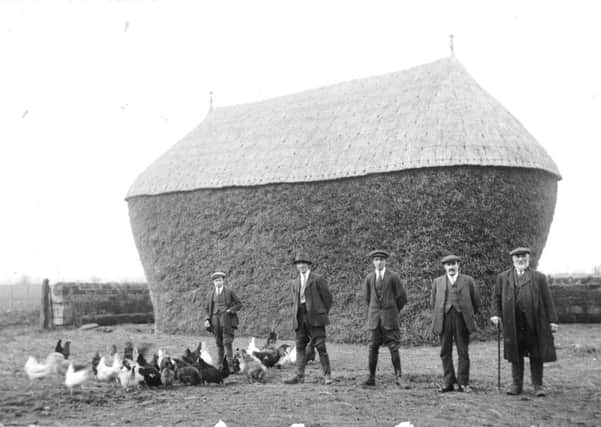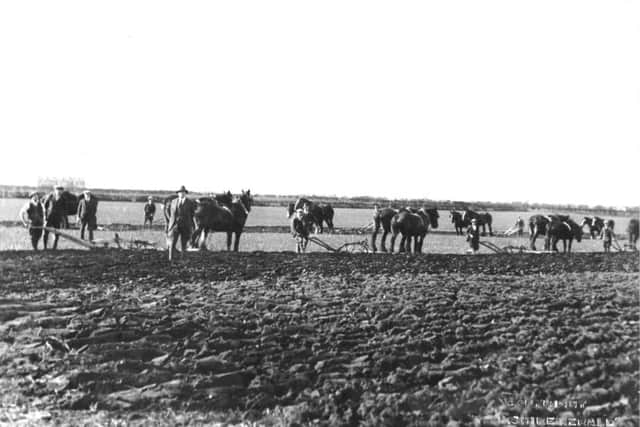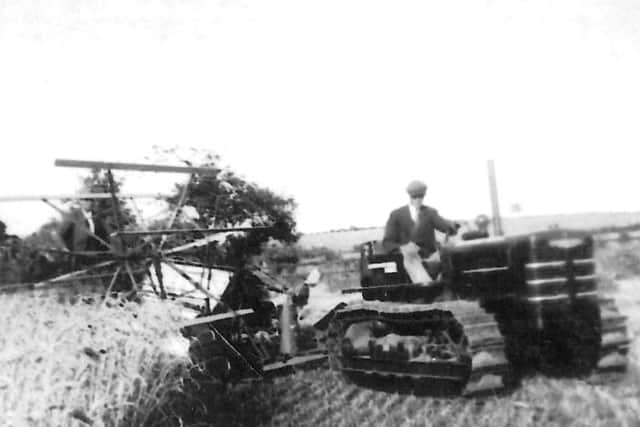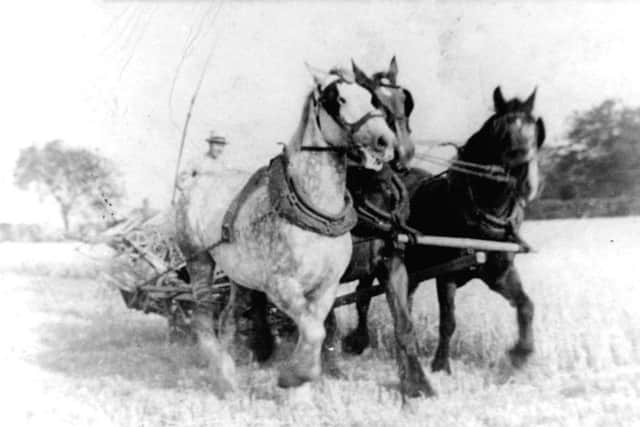Archive beauties help document Yorkshire farming from yesteryear


Regardless of perhaps some lazy general perceptions, agriculture has however always been forward-looking - relative to its time - a condition beholden to an industry which has the responsibility to produce more and more food as time passes, with more and more mouths to feed. And with increasing competition, standing still in farming always has been and always will be a downright dangerous thing.
This week we resume our retrospective look back at farming decades past. Courtesy once more of some quite wonderful images generously dug from the family archives of our readers to celebrate the county’s agricultural heritage, it serves as a reflection on how far farming has come and just how far it might change in the hands of new generations in the future.
Advertisement
Hide AdAdvertisement
Hide AdOur star photograph this time begs the question: Have you ever seen a stack quite like this?


Chances are, probably not, for the picture is a detailed depiction of the flawless efforts of Bill Shepherd’s ancestors prior to the outbreak of the First World War.
Mr Shepherd, aged 91, writing in from Laughton-en-le-Morthen near Sheffield, explained in his letter: “I have lived with it (this photograph) all my life but have had it blown up and it hangs on the wall. I think it would have been taken around 1910 to 1914 according to my uncles’ and my mothers’ ages.”
A note on the back of the photograph indicates that Mr Shepherd’s grandfather, Herbert Beech Senior (on the far right), was born in 1850, and his uncles, Ernest Beech (third from right) and Herbert Beech (fourth from right), were born in 1897 and 1892, respectively.
Advertisement
Hide AdAdvertisement
Hide AdMr Shepherd writes: “My mother was married from the farm where the stack of oats stood. Shame to thresh it.”


Jumping forward a few years in time and a glorious package of photographs sent in by David Ward, 78, of Leyburn, North Yorkshire, brings to life in vivid black and white scenes a snapshot of hard work on his family’s farm near Bawtry, Doncaster, and later at Thorne, some 15 miles up the road.
Whilst it is sadly not possible to showcase the full selection of Mr Ward’s family photographs here, we have chosen to share with you a shot of Mr Ward’s father, Tom, seated looking rather proud on his International Crawler tractor at harvest time in the early 1940s.
This particular image was taken using a folding pocket Kodak camera that was typical of the early 20th century.
Advertisement
Hide AdAdvertisement
Hide AdMore photographs of Tom in action on the farm show him on a “three horse binder”, amongst breeding mares and with a horse rake, all in the 1920s.


This was a world which Mr Ward would eventually step into himself at the end of his formal education, a profession that he steadfastly stuck with through decades of change and innovation right up to the late 1990s.
Mr Ward writes in his letter: “Before the First World War, Grandfather and Father farmed near Bawtry, moving to Bankside Farm, Thorne in 1943.
“After grammar school and agri college, I joined them full-time in the mid-1950s, working in agriculture until retirement in 1997.”
Advertisement
Hide AdAdvertisement
Hide AdMr Ward’s own application in the fields is impressively shown in another picture he sent in which captures the almighty sight of a massive haul of corn sheaves that are stacked at least 10ft tall along the entire length of an eight-wheel trailer. Clearly there was pride in a job well done as Mr Ward took the photograph himself, training his sights with a Kodak Brownie Reflex camera; a piece of kit used widely in the 1940s and 1950s.


You just don’t see scenes like the one captured in an all-action print addressed to The Yorkshire Post by Valerie Goodbold of Middleton, Pickering, anymore. The photograph shows a trio of horses being put to work in fields in the borderlands where the old South and West Ridings of Yorkshire met. It shows Ms Goodbold’s late father-in-law in the mid-1930s harvesting oats with ‘three-in-hand’.
A horseman by trade, Frank Goodbold worked on a farm in Wath-on-Dearne owned by Whitworth’s Brewery.
Of course horsepower was the engine room of the trade long before the mechanical revolution that set the pace for today’s intricate machinery and that bygone era is illustrated rather acutely in a photograph delved from the collections of Derek Train from Bessacarr, Doncaster.
Advertisement
Hide AdAdvertisement
Hide AdMr Train provided the following narrative to accompany the image: “My father Reg Train worked on farms all his life. He was born in 1910 and died in 1988.
“I enclose a photograph you may be interested in which shows men and horses ploughing; this was at Mr Ramsden’s Home Farm, Helperby in 1927.
“My father who was 17 at the time is on the back row with the second pair of horses from the right. He told me that there were ten pairs of horses ploughing on that day.”


SHARE YOUR FARMING MEMORIES
We are keen to continue to take retrospective glances at farming’s great past both online and in future editions of The Yorkshire Post on Saturday’s Country Week pull-out and would love to receive more of your photographs.
Advertisement
Hide AdAdvertisement
Hide AdWhether they are images of farm work being undertaken in the fields, the pens or the parlours, all will be considered for publication in what we hope will become a regular slot.
To submit your pictures, please write to: Ben Barnett, The Yorkshire Post, Country Week, 26 Whitehall Road, Leeds, LS12 1BE.
If sending pictures electronically, email [email protected]
Please remember to include a description of the content and full contact details. All photographs sent by post will be returned.